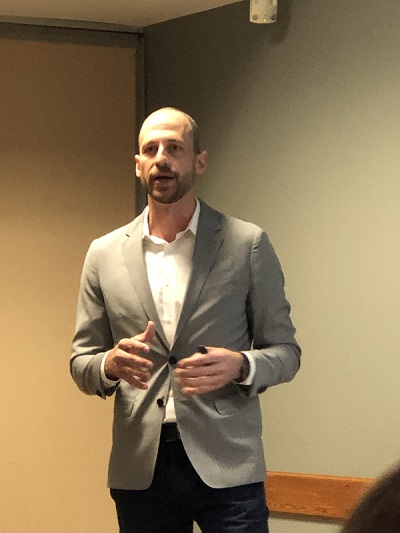Artificial Intelligence and Big Data Essential to Digital Marketing, Kraus Says at DigiCON
Despite some hiccups, the use of artificial intelligence (AI) and big data in marketing will continue to flourish as companies look for new ways to influence consumer behavior, said the head of a Morristown-based digital marketing firm at a recent tech conference.
Nick Kraus, founder and CEO of Kraus Marketing, said that today’s marketing strategies, dominated by the likes of digital giants Google, Facebook, Instagram and Twitter, have become smarter and more pervasive as the result of AI and data analytics providing deeper insights into consumers’ buying habits.
Kraus was one of several speakers who presented their views on the rapid growth of digital marketing at the DigiCON 2019 conference, held on October 11 at the County College of Morris, in Randolph. The Morris County Chamber of Commerce hosted the event.
The use of AI and big data for marketing purposes has been around for awhile, but many businesses, especially smaller ones, may not know how to apply these technologies to various marketing tools, such as social media, email, search engine optimization and websites.
For example, Kraus recommended that companies use Google optimization tools to convert their websites from digital brochures into powerful marketing engines, allowing users to bolster email campaigns and other ways to deliver content to their target audience.
AI and machine learning have also had a tremendous impact on the gathering of valuable data regarding the public’s use of social media , which is “the only thing that people do more in this country than eat,” Kraus said.
Using these advanced technologies in social media platforms can help increase sales leads, boost customer experience and allow people to better communicate with each other.
Kraus pointed out that Netflix is one of most successful companies to combine AI and data science for marketing purposes, in this case to promote its subscription-based streaming service.
Netflix uses AI-driven technology to keep its viewers hooked on watching its movies, TV shows and other content. The technology uses a history of the types of shows subscribers have watched to offer them other, similar shows that might interest them. “It’s as simple as that,” Kraus said.
Sometimes, however, high-tech marketing can be used for nefarious purposes or have unintended consequences. Kraus said that Facebook has faced both problems.
In one instance, Facebook made headlines when personal data of millions of its users were improperly obtained to target voters in the 2016 U.S. presidential election.
The now-defunct Cambridge Analytica, a British political consultancy, was hired by the Trump campaign to use data analytics to build profiles of Americans, in order to personalize a marketing campaign aimed at voters.
This strategy was used to turn wishy-washy Trump supporters into loyal followers after consuming all of “the content that was fed to them” on social media, Kraus said.
“Right or wrong, that’s what happened,” Kraus added. “That’s how he got into office when he was not a front-runner from the start.”
In another instance, in 2017, Facebook encountered more tech troubles when two AI programs began chatting with each other in a strange language that they had created, and that couldn’t be understood by the company’s technicians. That caused Facebook to abruptly end its experiment with these programs.
“They got nervous about what these robots were talking about.” Kraus said.




